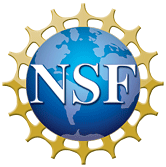
Support

Award #1047916:
CyberGIS Software Integration for Sustained Geospatial Innovation
"Originally developed by geographers in the mid-1960s, Geographic Information Systems (GIS) have flourished since that time. In the foreseeable future, GIS software will continue to play essential roles for breaking through scientific challenges in numerous fields and improving decision-making practices with broad societal impacts. This project will establish CyberGIS as a fundamentally new software framework comprising a seamless integration of cyberinfrastructure, GIS, and spatial analysis/modeling capabilities. Specifically, the project will:
- 1) engage a multidisciplinary community through a participatory approach in evolving CyberGIS software requirements;
- 2) integrate and sustain a core set of composable, interoperable, manageable, and reusable CyberGIS software elements based on community-driven and open source strategies;
- 3) empower high-performance and scalable CyberGIS by exploiting spatial characteristics of data and analytical operations for achieving unprecedented capabilities for geospatial knowledge discovery;
- 4) enhance an online geospatial problem solving environment to allow for the contribution, sharing, and learning of CyberGIS software by numerous users, which fosters the development of education, outreach, and training programs crosscutting multiple disciplines;
- 5) deploy and test CyberGIS software by linking with national and international cyberinfrastructure to achieve scalability to significant sizes of geospatial problems, cyberinfrastructure resources, and user communities; and
- 6) evaluate and improve the CyberGIS framework through domain science applications and vibrant partnerships to gain better understanding of the complexity of coupled human-natural systems."
More information can be found on the NSF website here: Award #1047916
Award #1243095:
Linking Human and Earth System Models to Assess Regional Impacts and Adaption in Urban Systems and Their Hinterlands
"Within the next three decades, climate variability, climate change and global development trends could have varied and profound effects on human well-being, especially in the developing world. Understanding how human and earth system trajectories will interact is essential to making better decisions that can reduce negative consequences for society and ecosystems.
To address these issues, better approaches to impact assessment are required that provide richer, higher resolution, and more internally consistent information about future societal and earth system conditions, and that link models of human and earth systems more effectively. The central objective of this proposal is to improve understanding of the joint consequences of socio-economic development and regional climate change by developing and applying tools to better integrate human and earth system models. This objective will be pursued by focusing on impacts in three key systems - urban areas, agriculture, and forests - in three regional case studies in rapidly developing countries - China, India, and Brazil. The project will develop an integrated suite of community tools for linking the most relevant type of global human system model, integrated assessment models (IAMs), with the Community Earth System Model (CESM), developed and validated through broad-based scientific collaboration and community support over the past 15 years. It will employ these tools to link the CESM with one IAM, the integrated Population-Economy-Technology-Science (iPETS) model, and carry out end-to-end impact assessments for our case study regions, from socio-economic scenario development through earth system analysis to impact and adaptation assessment. These assessments will serve as a proof-of-concept for this new modeling framework as well as produce valuable assessment information. Importantly, the research framework will be applicable in other human systems, in other regions, and with other IAMs than those employed here, to contribute to an even broader understanding of the human consequences of climate change."
More information can be found on the NSF website here: Award #1243095
Award #1525012:
Simulation-Based Policy Analysis for Reducing Ebola Transmission Risk in Air Travel
"The researchers on this project will build fine-scale simulation models for infection spread during air travel in order to identify the causes of infection spread, as well as procedures and policies that will limit its spread without major disruption to air travel. The researchers propose to create a super-computing based application that will provide useful insight to decision makers - such as medical responders, policy makers etc. dealing with Ebola. The models can be applied at the level of individual flights; thus not only can the spread of Ebola be understood for a particular flight, but also procedures can be developed that will limit the infection risk for that flight.
Results of this work will provide valuable insight to policy makers. In particular, fine grain questions regarding plane travel can be asked and answered, such as:
- (a) the risk air travel has on disease spread to neighboring regions
- (b) can a change to another type of a plane lead to reduced risk of transmission?
- (c) Do certain seating arrangement or changes to boarding and disembarkation processes reduce the likelihood of transmission?"
More information can be found on the NSF website here: Award #1525012